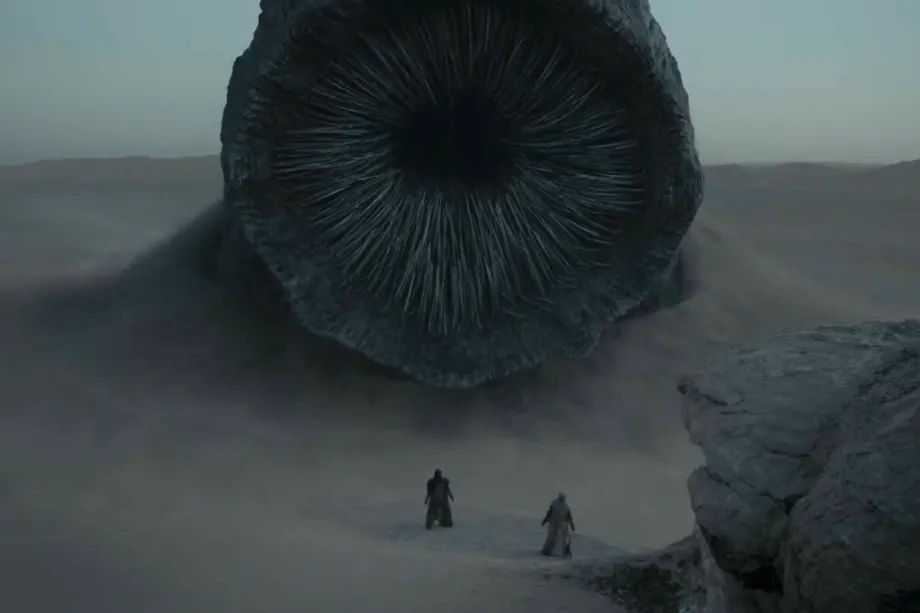Denis Villeneuve’s Dune feels bigger and louder than the trailers make it look
Theater closures have put big delays on one of 2020’s most anticipated films: Denis Villenueve’s Dune, the newest attempt to film Frank Herbert’s unfilmable and indelible science fiction epic. Fans have had to make do with just one trailer for months until this week, when Warner Bros. and Legendary Films revealed the first 10 minutes of the movie to press.
Polygon was fortunate enough to be able to attend the IMAX screening, which offered a lot more of Dune than the sword fights and explosions in the trailers. So if you can’t wait for the new trailer of Dune to be revealed tomorrow, here’s a taste of what we saw.
[Ed. note: This piece contains some spoilers for scenes from the upcoming Dune movie — as well as for Dune, the book from 1965.]
Dune throws out as much exposition as possible as quickly as it can — a reasonable choice for a world as alien as the Padishah Empire — opening with the voice of Zendaya’s character, Chani, describing the imperial pressure of the Harkonnen boot on the Fremen tribes of Arakkis.
It’s a smart move to include Zendaya as a framing device, since although she’s important to the overall plot of Dune, she is unlikely to appear much elsewhere in the movie. Chani is almost entirely absent from the first half of the Dune novel — appearing mostly in the dreams of Timothée Chalamet’s regal character, Paul Atreides. This new adaptation of Dune is expected to limit itself to covering roughly the first half of the book. (Legendary has not yet given a greenlight to a sequel, though a spinoff based on witchy, eugenics-focused Bene Gesserit was ordered.)
Whether intentional or not, the opening is something of an evolution on David Lynch’s Dune, which began with another of Paul Atreides’ paramours who barely appears in the film: The imperial princess Irulan, superimposed like a specter over the galaxy’s stars as she told us all about the Spice.
With Chani’s final line — “Who will our next oppressors be?” — images of sand and ships fade to the title screen and then back into Paul Atreides, waking up in his comfy bed in his father’s palace, with rain audibly drumming on the window. It’s an obvious juxtaposition, but an important one for Dune.

The exposition continues to ebb and flow. Soon after, Paul and his mother demonstrate the Bene Gesserit ability to compel others using only your voice. Later he literally sits down and looks at a stillsuit diagram while we listen to another book reciting the Imperial equivalent of the Arrakis Wikipedia Entry to him out loud. Despite all the frontloaded info, Dune’s opening left other things to mystery — the capabilities of mentat Thufir Hawat and the spookily robed Guild Navigators appear, but without much underlining.
By the end of the first 10 minutes, House Atreides had taken its first steps towards the Spice world itself. To give a taste of the rest of the movie, Warner Bros. showcased what’s likely the first major action sequence in the movie, with Paul and Duke Leto’s early confrontation with a spice harvester in distress. The presentation was followed by a Q&A with Villenueve and composer Hans Zimmer, and a look at a new trailer, set for release on Thursday.
That footage alone gave a sense of Villenueve returning to some of the imagery that made Arrival and Blade Runner 2049 so arresting — just more, more, more. The director frames his establishing shots so as to dwarf the human figures in them, and the intra-stellar ships seen in the footage are almost horrifyingly large, the kind of size that make the brain rebel at the idea that they can leave the ground at all.
In a Q&A with Hans Zimmer, Villenueve revealed that that commitment to keeping Dune alien, despite its human characters, extended to the film’s score as well.
“Whenever I saw a movie about empires far far away, other planets etc., I always heard trumpets and french horns and cellos playing,” Zimmer said, “and I’m thinking wow there are all these amazing civilizations in different galaxies places and in different times and they have the same instruments as we do!”
The composer’s goal was to get as far away from the typical John Williams/space epic score as possible, in part by trying to “invent our own instruments.”
The musical sounds in Warner Bros.’ presentation included low, didgeridoo-like droning, harsh percussion, whining chromatic strings, and discordant wordless vocals from a largely female chorus.
“The one thing that I felt would hold true to any civilization on any world was the human voice,” Zimmer shared, adding that the chorus was also a tribute to the pivotal female characters in Dune.
Dune hits theaters around the world and HBO Max on Oct. 22, 2021.
